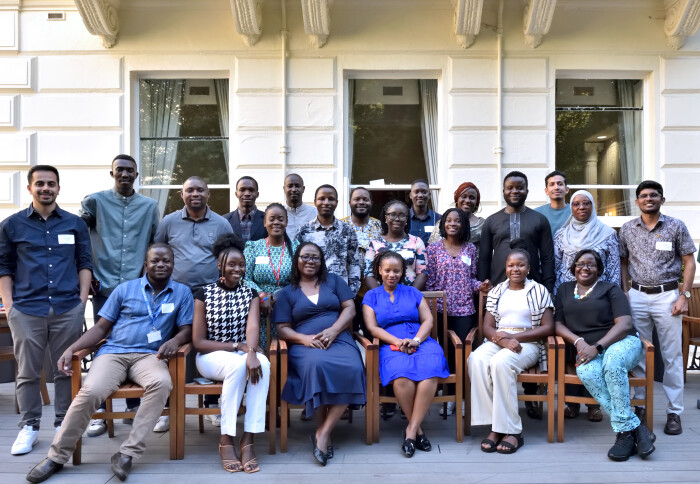Students celebrate completing international research fellowships

The first cohort of research students supported by Imperial’s Global Development Hub Fellowship have successfully completed their placements.
With the support of their supervisor in their home country and a host supervisor at Imperial, 32 students from 16 countries including Sri Lanka, Mozambique and the Democratic Republic of Congo undertook a variety of placements in all four of Imperial’s faculties.
Research projects included:
- using geospatial and dynamic modelling to understand malaria transmission in Mozambique (Alfredo Muxlhanga, Department of Mathematics)
- co-designing a clinical decision support system to support healthcare professionals in diagnosing febrile illnesses in Sub-Saharan Africa (Faiza Umar Bawah, Dyson School of Design Engineering)
- studying the relationship between Tanzanian children’s exposure to aflatoxins (toxins produced by some fungi that are found on agricultural crops) and micronutrient deficiencies (Naelijwa Mshanga, School of Public Health)
- enhancing the capabilities of single molecule localisation microscopy through advanced image processing techniques (Pranjal Choudhury, Department of Physics)
- evaluation of Facebook content on non-communicable disease prevention used in Sri Lanka (Thilak Wanasinghe, Imperial College Business School).
The Global Development Hub Fellows Fund was set up earlier this year with Imperial’s ISPF Institutional Support Grant Official Development Assistance award, provided by Research England. The new programme supports high impact, short-term research placements for PhD students living and studying in least developed and low- and middle-income countries. The scheme aims to give talented students the opportunity to further their research, broaden their networks, and deepen connections with partners overseas for future collaborations. Awards cover costs including a living allowance, flights, travel and visa fees.
Student experiences
Pascal Sungu-Ngoy, affiliated with the University of Douala and the Center for Research in Infectious Diseases (CRID) in Cameroon, has been working under Professor Thomas Churcher’s guidance to apply mathematical modelling to malaria control. He said: "This experience has enhanced my skills and broadened my perspective on innovative solutions for global challenges. I now have essential insights to make meaningful contributions to malaria eradication efforts in my home country, the Democratic Republic of Congo (DRC)".
“The Global Development Hub offers a platform to collaborate with a wide range of stakeholders - academia, governments, NGOs, and industry - which is essential for expanding effective malaria control efforts. Being part of this network will help me reach a broader audience and share my findings, leading to sustainable improvements in malaria management not only in the DRC but also globally.”
For her PhD, Faiza Umar Bawah from the University of Ghana is working on the design of intuitive user interfaces to help health professionals diagnose febrile illnesses in Africa. Speaking of her placement in Imperial’s Dyson School of Design Engineering she said: “The Global Development Hub fellowship was a pivotal opportunity to internationalise my PhD and broaden my understanding of human-computer interaction. The placement facilitated invaluable interactions with researchers from various disciplines, enhancing my appreciation for interdisciplinary research. The fellowship has given me a fresh perspective on design engineering, which I intend to incorporate into my research in Ghana, Africa, and beyond.”
Celebrating successful placements
Imperial recently hosted a celebratory reception for the first cohort of students to mark the end of their research placements. The supervisors and students were welcomed by Professor Michael Templeton, co-Chair of the Global Development Hub and Sir David Nabarro, Co-Director of the Institute of Global Health Innovation, who briefly spoke of the importance of international collaboration and interdisciplinary research to solve global challenges.
 Professor Templeton said: “The Global Development Hub brings together Imperial’s community and our international partners to maximise the global impact of STEMB-focused research, education and innovation, engage with the United Nations Sustainable Agenda 2030, and work with some of the most vulnerable and marginalised in societies where multiple global challenges are acutely concentrated. The Global Development Fellowship strengthens our links across the globe with countries including Ghana, Malawi, Senegal, Mozambique, India, Sri Lanka, Mongolia, and many more.
Professor Templeton said: “The Global Development Hub brings together Imperial’s community and our international partners to maximise the global impact of STEMB-focused research, education and innovation, engage with the United Nations Sustainable Agenda 2030, and work with some of the most vulnerable and marginalised in societies where multiple global challenges are acutely concentrated. The Global Development Fellowship strengthens our links across the globe with countries including Ghana, Malawi, Senegal, Mozambique, India, Sri Lanka, Mongolia, and many more.
“The programme was so successful that not only are we now starting on arrangements for the second cohort, we are also putting in place seed funding opportunities for students who have completed this year’s placements.”
Professor Mary Ryan, Imperial's Vice-Provost for Research and Enterprise, recognised the importance of the scheme saying "Our Global Development Hub Fellowships at Imperial highlight our commitment to international partnership and cooperation in research, addressing global challenges from malaria control in Mozambique to developing healthcare technologies in Sub-Saharan Africa. These fellowships enhance scientific knowledge and strengthen global networks, reflecting our dedication to fostering equitable, sustainable solutions for people and planet."
Article text (excluding photos or graphics) © Imperial College London.
Photos and graphics subject to third party copyright used with permission or © Imperial College London.
Reporter
Corinne Farrell
Communications Division